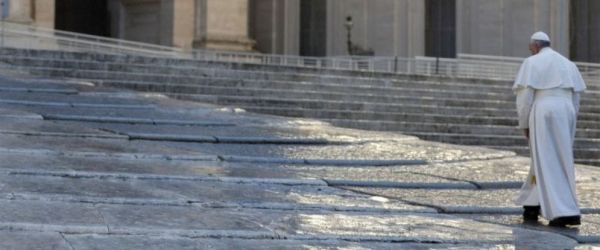In today’s Gospel passage (cf. Mt 22:34-40), a doctor of the Law asks Jesus “which is the great commandment” (v. 36), that is, the principal commandment of all divine Law. Jesus simply answers: “You shall love the Lord your God with all your heart, and with all your soul, and with all your mind” (v. 37). And he immediately adds: “And a second is like it, You shall love your neighbour as yourself” (v. 39).
Jesus’ response once again takes up and joins two fundamental precepts, which God gave his people through Moses (cf. Dt 6:5; Lv 19:18). And thus he overcomes the snare that is laid for him in order “to test him” (Mt 22:35). His questioner, in fact, tries to draw him into the dispute among the experts of the Law regarding the hierarchy of the prescriptions. But Jesus establishes two essential principles for believers of all times; two essential principles of our life. The first is that moral and religious life cannot be reduced to an anxious and forced obedience. There are people who seek to fulfil the commandments in an anxious or forced manner, and Jesus helps us understand that moral and religious life cannot be reduced to anxious or forced obedience, but must have love as its precept. The second principle is that love must tend together and inseparably toward God and toward neighbour. This is one of the primary innovations of Jesus’ teachings, and it helps us understand that what is not expressed in love of neighbour is not true love of God; and, likewise, what is not drawn from one’s relationship with God is not true love of neighbour.
Jesus concludes his response with these words: “On these two commandments depend all the law and the prophets” (v. 40). This means that all the precepts the Lord has given to his people must be related to love of God and neighbour. In fact, all the commandments serve to implement, to express that twofold indivisible love. Love for God is expressed above all in prayer, particularly in adoration. We neglect the adoration of God a great deal. We recite the prayer of thanksgiving, the supplication to ask for something..., but we neglect adoration. Adoring God is precisely the heart of prayer. And love for neighbour, which is also called fraternal charity, consists in closeness, listening, sharing, caring for others. And so often we neglect to listen to others because it is boring or because it takes up our time, or [we neglect] to accompany them, to support them in their suffering, in their trials.... But we always find the time to gossip, always! We do not have time to console the afflicted, but so much time to gossip. Be careful!
The Apostle John writes: “he who does not love his brother whom he has seen, cannot love God whom he has not seen ” (1 Jn 4:20). Thus, we see the unity of these two commandments.
In today’s Gospel passage, once again, Jesus helps us go to the living and gushing wellspring of Love. And this wellspring is God himself, to be loved completely in a communion that nothing and no one can break. A communion that is a gift to be requested each day, but also a personal commitment not to let our lives become enslaved by the idols of the world. And the proof of our journey of conversion and holiness always consists in love of neighbour. This is the test: if I say “I love God” and do not love my neighbour, it does not work. The verification that I love God is that I love my neighbour. As long as there is a brother or sister to whom we close our hearts, we will still be far from being disciples as Jesus asks us. But his divine mercy does not allow us to be discouraged, but rather calls us to begin anew each day to live the Gospel consistently.
May the intercession of Mary Most Holy open our hearts to welcome the “great commandment”, the twofold commandment of love, which contains all of God’s Law and on which our salvation depends.
[Pope Francis, Angelus 25 October 2020]












